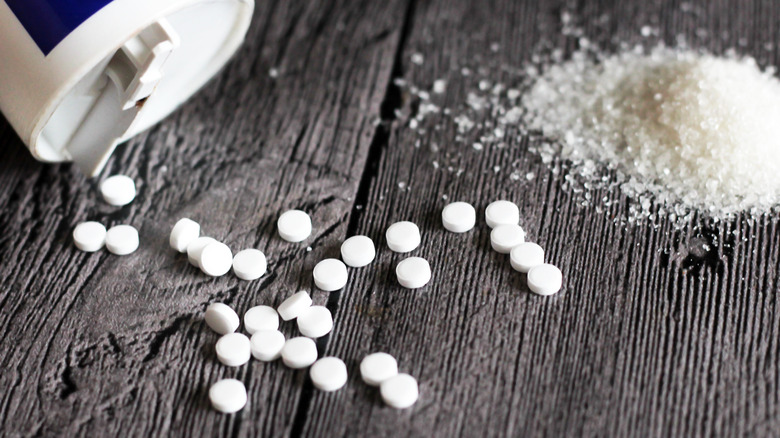When You Eat Artificial Sweeteners, This Is What Happens To Your Body
Increasingly more consumers are swapping sugar for artificial sweeteners in an attempt to eat healthier. Some see it as a way to cut calories, while others want to avoid the side effects of sugar. Unfortunately, artificial sweeteners might not be as safe as you think, especially when used regularly.
For example, a 2015 study published in the British Medical Journal suggests that artificially sweetened beverages pose similar health risks as regular soda. As the researchers note, these drinks are unlikely to prevent diabetes. Over time, they may actually increase diabetes risk. Other studies indicate that non-caloric sweeteners may contribute to cancer, immune disorders, insulin resistance, and chronic fatigue (via the Indian Heart Journal).
These findings are subject to debate, though. The FDA states that there's not enough evidence to confirm the potential risks of aspartame and other sugar substitutes. However, these additives don't require FDA approval before going on the market, which further adds to the confusion. So, what happens to your body when you eat artificial sweeteners? Let's find out.
Artificial sweeteners activate your brain's reward system
When you eat a piece of chocolate, your brain releases dopamine, a "feel-good" chemical. Its effects wear off within hours, so you reach for another piece of chocolate. Sugary foods may also affect inhibitory neurons in the central nervous system, making it difficult to control your behavior. Simply put, sugar has addictive effects and can lead to overeating, explains Live Science.
Artificial sweeteners have similar effects, according to Frontiers for Young Minds. These additives partially activate the brain's reward system and alter your taste buds, increasing hunger and sugar cravings. Since they don't fully activate the reward pathways, they cause less pleasure than sugary foods. As a result, you may end up overeating or choosing higher-calorie foods to feel satisfied. The same source reports that cutting out sugar and artificial sweeteners can diminish cravings within a week.
Sugar substitutes may also alter satiety signals to the brain. "[Artificial sweeteners] are fooling the body, and once it's fooled enough, it's just not going to respond anymore," Kristina Rother, MD, told Time. On top of that, people who consume artificial sweeteners are more likely to adopt compensatory behaviors, says Rother. For example, they may drink two bottles of diet soda instead of one or eat a whole box of sugar-free cookies, taking in hundreds of empty calories.
An increase to blood sugar and insulin levels
Artificial sweeteners may also affect blood sugar and insulin levels in the long run, notes Healthline. Sucralose, for example, activates the sweet taste receptors, causing insulin spikes. In animal studies, acesulfame potassium increased insulin levels by up to 210%. Aspartame doesn't seem to have this effect. Sorbitol, xylitol, and other sugar alcohols, on the other hand, can skyrocket blood glucose levels, warns the Mayo Clinic.
Most studies have conflicting results, but researchers seem to agree that sugar substitutes pose health risks. A 2017 review of 30 cohort studies and seven trials that followed over 400,000 people for 10 years reports that artificial sweeteners can significantly increase the risk of diabetes and metabolic syndrome. Scientists also found a strong association between these additives and hypertension, high blood pressure, and heart disease (via the Canadian Medical Association Journal).
These side effects are not immediate, and it could take you years to develop metabolic syndrome, insulin resistance, or heart disease. Like with everything else, moderation is key. An occasional diet soda or sugar-free chocolate won't cause any harm. But it's one thing to enjoy these treats every now and then, and another thing to consume them regularly.
Sugar substitutes can also alter your gut flora
The human gut is home to more than 100 trillion microbes (per the International Journal of Molecular Science). What you eat and drink, as well as your lifestyle habits, can help or harm your gut bacteria. Sugar substitutes may encourage the growth of "bad" gut bacteria, leaving your body vulnerable to disease. These food additives might also alter gut microbial diversity, cause leaky gut, and trigger inflammation.
Artificial sweeteners are processed differently than sugar and other natural foods, notes the Canadian Society of Gastrointestinal Research. After ingestion, they remain intact through the GI tract and may alter the gut flora. In the long run, they can affect the bacteria responsible for glucose metabolism, digestion, and other physiological processes.
These compounds may also cause bloating, gas, diarrhea, and digestive discomfort. "When the chemical structure of a sugar changes, it also affects how the body responds to it," nutritionist Lorraine Kearney told Bustle. You may also experience nausea, dizziness, headaches, or mood changes following the consumption of artificially sweetened foods. Remember — you can always satisfy your sweet tooth with pureed fruits, stevia, and other natural alternatives to sugar.



